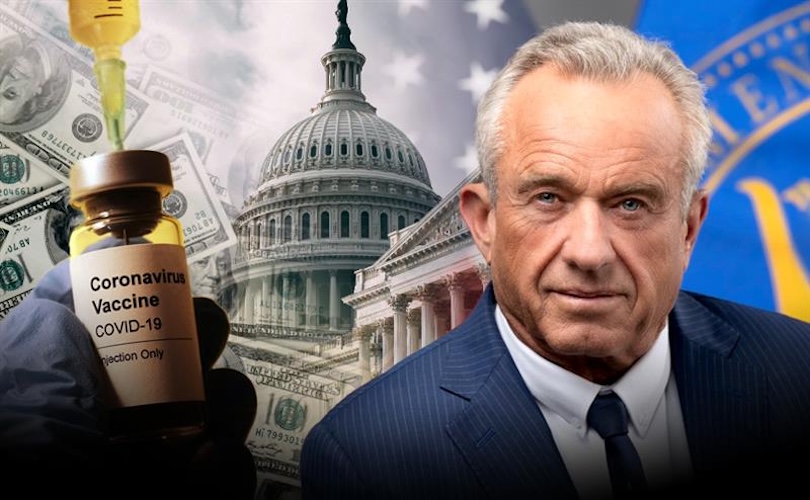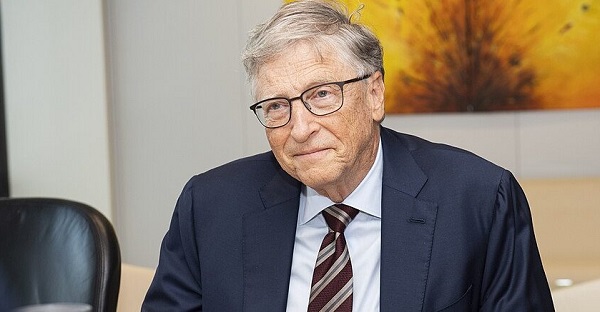Health
RFK Jr. cuts $500 million for mRNA vaccine projects, says no new contracts will be issued

From LifeSiteNews
Robert F. Kennedy Jr. announced that HHS is terminating 22 mRNA vaccine development contracts and moving away from the technology in favor of ‘safer’ alternatives.
The U.S. Department of Health & Human Services (HHS) has announced it is “winding down” almost $500 million worth of mRNA vaccine projects and rejecting future exploration of the technology in favor of more conventional vaccines, in perhaps the biggest delivery yet of what his supporters hoped for when President Donald Trump appointed Robert F. Kennedy Jr. to head the department.
“We reviewed the science, listened to the experts, and acted,” Kennedy said in a Tuesday press release. “BARDA [the Biomedical Advanced Research and Development Authority] is terminating 22 mRNA vaccine development investments because the data show these vaccines fail to protect effectively against upper respiratory infections like COVID and flu. We’re shifting that funding toward safer, broader vaccine platforms that remain effective even as viruses mutate.”
“Let me be absolutely clear: HHS supports safe, effective vaccines for every American who wants them. That’s why we’re moving beyond the limitations of mRNA and investing in better solutions,” Kennedy added.
We reviewed the science, listened to the experts, and acted. BARDA is terminating 22 mRNA vaccine development investments because the data show these vaccines fail to protect effectively against upper respiratory infections like COVID and flu. We’re shifting that funding toward… pic.twitter.com/GPKbuU7ywN
— Secretary Kennedy (@SecKennedy) August 5, 2025
Some projects will be canceled outright, while others will be modified to shift focus away from mRNA and toward other work. “While some final-stage contracts (e.g., Arcturus and Amplitude) will be allowed to run their course to preserve prior taxpayer investment, no new mRNA-based projects will be initiated,” HHS explains.
Republican Sen. Bill Cassidy of Louisiana, a doctor who voted to confirm Kennedy after receiving assurance he was less opposed to conventional vaccines than his history suggested, said the move has “conceded to China an important technology needed to combat cancer and infectious disease,” and “works against” President Trump’s goals to “Make America Healthy Again and Make America Great Again.”
READ: mRNA vaccines linked to genetic changes that can cause cancer, autoimmune disorders
When asked about HHS’s decision the next day, Trump said “we’re going to look at that” before declaring that his first administration’s Operation Warp Speed initiative, under which the COVID-19 shots were developed in record time, was “considered one of the most incredible things ever done in this country,” but suggested now the focus was on other solutions for other diseases. “We are speaking about it, we have meetings about it tomorrow … and we’ll determine,” the president said.
Whether or not mRNA research will resume in the future under more rigorous standards, the technology has drawn controversy due to its use by the most prominent COVID-19 shots, which were developed in record time by the first Trump administration’s Operation Warp Speed initiative.
The federal Vaccine Adverse Event Reporting System (VAERS) reports 38,709 deaths, 221,030 hospitalizations, 22,331 heart attacks, and 28,966 myocarditis and pericarditis cases as of June 27, among other ailments. U.S. Centers for Disease Control & Prevention (CDC) researchers have recognized a “high verification rate of reports of myocarditis to VAERS after mRNA-based COVID-19 vaccination,” leading to the conclusion that “under-reporting is more likely” than over-reporting.
An analysis of 99 million people across eight countries published in the journal Vaccine “observed significantly higher risks of myocarditis following the first, second and third doses” of mRNA-based COVID shots, as well as signs of increased risk of “pericarditis, Guillain-Barré syndrome, and cerebral venous sinus thrombosis,” and other “potential safety signals that require further investigation.” In April 2024, the CDC was forced to release by court order 780,000 previously undisclosed reports of serious adverse reactions, and a study out of Japan found “statistically significant increases” in cancer deaths after third doses of mRNA-based COVID-19 shots, and offered several theories for a causal link.
In May, U.S. Food & Drug Administration (FDA) commissioner Marty Makary and vaccine chief Dr. Vinay Prasad announced that there would no longer be blanket recommendations for all Americans to receive the shot, but the “risk factors” it would still be recommended for include asthma, cancer, cerebrovascular disease, chronic kidney diseases, a handful of chronic liver and lung diseases, diabetes, disabilities such as Down’s syndrome, heart conditions, HIV, dementia, Parkinson’s, obesity, smoking, tuberculosis, and more. Kennedy Jr. subsequently announced COVID shots would not be recommended to healthy children or pregnant women.
However, in June, the Trump administration approved a new mRNA-based COVID-19 shot from Moderna, for “individuals who have been previously vaccinated with any COVID-19 vaccine and are: 65 years and older, or 12 through 64 with at least one underlying condition that puts them at high risk for severe outcomes from COVID-19.”
Business
Bill Gates Gets Mugged By Reality


From the Daily Caller News Foundation
You’ve probably heard by now the blockbuster news that Microsoft founder Bill Gates, one of the richest people to ever walk the planet, has had a change of heart on climate change.
For several decades Gates poured billions of dollars into the climate industrial complex.
Some conservatives have sniffed that Bill Gates has shifted his position on climate change because he and Microsoft have invested heavily in energy intensive data centers.
AI and robotics will triple our electric power needs over the next 15 years. And you can’t get that from windmills.
What Bill Gates has done is courageous and praiseworthy. It’s not many people of his stature that will admit that they were wrong. Al Gore certainly hasn’t. My wife says I never do.
Although I’ve only once met Bill Gates, I’ve read his latest statements on global warming. He still endorses the need for communal action (which won’t work), but he has sensibly disassociated himself from the increasingly radical and economically destructive dictates from the green movement. For that, the left has tossed him out of their tent as a “traitor.”
I wish to highlight several critical insights that should be the starting point for constructive debate that every clear-minded thinker on either side of the issue should embrace.
(1) It’s time to put human welfare at the center of our climate policies. This includes improving agriculture and health in poor countries.
(2) Countries should be encouraged to grow their economies even if that means a reliance on fossil fuels like natural gas. Economic growth is essential to human progress.
(3) Although climate change will hurt poor people, for the vast majority of them it will not be the only or even the biggest threat to their lives and welfare. The biggest problems are poverty and disease.
I would add to these wise declarations two inconvenient truths: First: the solution to changing temperatures and weather patterns is technological progress. A far fewer percentage of people die of severe weather events today than 50 or 100 or 1,000 years ago.
Second, energy is the master resource and to deny people reliable and affordable energy is to keep them poor and vulnerable – and this is inhumane.
If Bill Gates were to start directing even a small fraction of his foundation funds to ensuring everyone on the planet has access to electric power and safe drinking water, it would do more for humanity than all of the hundreds of billions that governments and foundations have devoted to climate programs that have failed to change the globe’s temperature.
Stephen Moore is a co-founder of Unleash Prosperity and a former Trump senior economic advisor.
Alberta
Alberta government’s plan will improve access to MRIs and CT scans

From the Fraser Institute
By Nadeem Esmail and Tegan Hill
The Smith government may soon allow Albertans to privately purchase diagnostic screening and testing services, prompting familiar cries from defenders of the status quo. But in reality, this change, which the government plans to propose in the legislature in the coming months, would simply give Albertans an option already available to patients in every other developed country with universal health care.
It’s important for Albertans and indeed all Canadians to understand the unique nature of our health-care system. In every one of the 30 other developed countries with universal health care, patients are free to seek care on their own terms with their own resources when the universal system is unwilling or unable to satisfy their needs. Whether to access care with shorter wait times and a more rapid return to full health, to access more personalized services or meet a personal health need, or to access new advances in medical technology. But not in Canada.
That prohibition has not served Albertans well. Despite being one of the highest-spending provinces in one of the most expensive universal health-care systems in the developed world, Albertans endure some of the longest wait times for health care and some of the worst availability of advanced diagnostic and medical technologies including MRI machines and CT scanners.
Introducing new medical technologies is a costly endeavour, which requires money and the actual equipment, but also the proficiency, knowledge and expertise to use it properly. By allowing Albertans to privately purchase diagnostic screening and testing services, the Smith government would encourage private providers to make these technologies available and develop the requisite knowledge.
Obviously, these new providers would improve access to these services for all Alberta patients—first for those willing to pay for them, and then for patients in the public system. In other words, adding providers to the health-care system expands the supply of these services, which will reduce wait times for everyone, not just those using private clinics. And relief can’t come soon enough. In Alberta, in 2024 the median wait time for a CT scan was 12 weeks and 24 weeks for an MRI.
Greater access and shorter wait times will also benefit Albertans concerned about their future health or preventative care. When these Albertans can quickly access a private provider, their appointments may lead to the early discovery of medical problems. Early detection can improve health outcomes and reduce the amount of public health-care resources these Albertans may ultimately use in the future. And that means more resources available for all other patients, to the benefit of all Albertans including those unable to access the private option.
Opponents of this approach argue that it’s a move towards two-tier health care, which will drain resources from the public system, or that this is “American-style” health care. But these arguments ignore that private alternatives benefit all patients in universal health-care systems in the rest of the developed world. For example, Switzerland, Germany, the Netherlands and Australia all have higher-performing universal systems that provide more timely care because of—not despite—the private options available to patients.
In reality, the Smith government’s plan to allow Albertans to privately purchase diagnostic screening and testing services is a small step in the right direction to reduce wait times and improve health-care access in the province. In fact, the proposal doesn’t go far enough—the government should allow Albertans to purchase physician appointments and surgeries privately, too. Hopefully the Smith government continues to reform the province’s health-care system, despite ill-informed objections, with all patients in mind.
-

 Justice2 days ago
Justice2 days agoCarney government lets Supreme Court decision stand despite outrage over child porn ruling
-

 Business2 days ago
Business2 days agoCarney’s budget spares tax status of Canadian churches, pro-life groups after backlash
-

 COVID-192 days ago
COVID-192 days agoFreedom Convoy leader Tamara Lich to appeal her recent conviction
-

 Daily Caller2 days ago
Daily Caller2 days agoUN Chief Rages Against Dying Of Climate Alarm Light
-

 Business21 hours ago
Business21 hours agoCarney budget continues misguided ‘Build Canada Homes’ approach
-

 Business2 days ago
Business2 days agoU.S. Supreme Court frosty on Trump’s tariff power as world watches
-

 Business22 hours ago
Business22 hours agoCarney budget doubles down on Trudeau-era policies
-

 espionage1 day ago
espionage1 day agoU.S. Charges Three More Chinese Scholars in Wuhan Bio-Smuggling Case, Citing Pattern of Foreign Exploitation in American Research Labs











